Russia Reform Monitor: No. 2052
Russia withdraws from Syria... somewhat;
The Obama administration holds the sanctions line
Russia withdraws from Syria... somewhat;
The Obama administration holds the sanctions line
Last week, a fresh political scandal erupted on Capitol Hill over Iran. At issue was a new plan being considered by the Obama administration to provide Iran's ayatollahs with limited access to the U.S. financial system as a sweetener for their continued compliance with their government's 2015 nuclear deal with the nations of the P5+1.
Russian President Vladimir Putin's March 14 announcement of a partial withdrawal of forces from Syria predictably surprised the Obama administration, which is habitually surprised by the current occupant of the Kremlin. In doing so, it became part of a larger pattern. Recent Russian-American ties demonstrate all too clearly that President Barack Obama still fails to grasp what it is, exactly, that Russia wants - and why it is successfully achieving these objectives despite the country's growing domestic crises.
A Hezbollah withdrawal...perhaps;
One step forwards, two steps back in Afghanistan;
France's abortive CT plan;
Israel girds for ISIS incursion
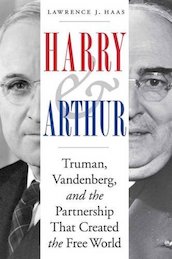
This book shares the untold story of how Democratic President Harry Truman and Republican Senator Arthur Vandenberg worked together in the perilous late 1940s to produce a revolutionary new U.S. foreign policy that has served America well ever since – with the United States seizing global leadership to protect its friends, confront its enemies, and promote freedom.
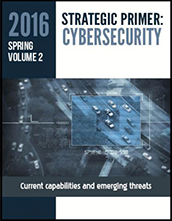
The goal of the new Strategic Primer initiative is to provide a concise, comprehensive overview of specific defense technology issues presented in a clear, direct, and graphical manner that serves as an accessible reference to policymakers. Volume 2 of the series focuses on Cybersecurity.
Former separatist fighter spills the beans;
Goodbye to the UN (in Russia)
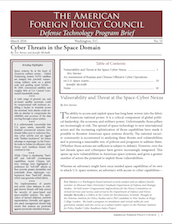
The ability to access and exploit space has long been woven into the fabric of American national power. It is a critical component of global political leadership, the economy, and military power. Unfortunately, those pillars are increasingly at risk. The spread of space technology to new international actors and the increasing sophistication of those capabilities have made it possible to threaten American space systems directly. The national security community is accustomed to analyzing these threats and vulnerabilities and is pursuing a reasonable mix of policies and programs to address them. (Whether those actions are sufficient is subject to debate). However, over the last decade space and cyberspace have grown increasingly integrated. This opens up new vulnerabilities in American space systems, and gives a greater number of actors the potential to exploit those vulnerabilities...
U.S. and China trade barbs at Human Rights Council;
Gambia ditches Taiwan, restores relations with China
Pak eyes more U.S. F-16S;
Hackers targeting Indian defense establishment;
India signs 28 defense contracts;
Pak seeks stronger ties with Sri Lanka;
Border forces to be withdrawn from LOC?
Hong Kong residents flock to the U.S.;
Beijing rewriting rules for car-hailing services
The strange case of Igor Sergun;
Political protests not allowed
Call it Vladimir Putin's "mission accomplished" speech.
The Russian president recently caused an international furor when he abruptly announced that his government was commencing a military withdrawal from Syria. Russia had "radically changed the situation" on the ground through its involvement, and its strategic objectives had been "generally accomplished," Putin said in a televised meeting with top advisors in Moscow, including Defense Minister Sergei Shoigu and Foreign Minister Sergei Lavrov. As a result, Russia's commander-in-chief declared, he had made the decision "to start withdrawal of the main part of our military group from the territory of the Syrian Arab Republic starting from tomorrow."
Iranians are famously savvy negotiators, so recent revelations that, under the U.S.-led global nuclear deal, Iran has far more leeway than we had thought to hide its nuclear progress and test ballistic missiles shouldn't surprise us.
It should, however, alarm us.
Report: Russia complicit in MH17 downing;
Kadyrov blinks in contest with the Kremlin
Construction begins on China’
s first overseas military base;
Beijing cracks down on financial reporting amid crisis
Corruption: Scourge of Central Asia;
A shrinking Russian footprint in Tajikistan;
Kazakhstan, speaking plainly Kyrgyzstan tightens control over Islamic education
Beijing overtakes New York in number of billionaires;
China wants patriotic education for all students, even those abroad
Iran's elections: Less than meets the eye;
The Iranian military goes on the sectarian offensive;
A soaring execution rates;
Nuclear oversight of Iran shrinks
Russia goes its own way on Afghanistan;
Amnesty: Russia guilty of "
war crimes"
in Syria
Xi tours China's new media, demands loyalty to the Party;
China eyes $20 billion in new financing for Iran
Russian NGOs under fire yet again;
Moscow expands Mediterranean presence
China braces for fallout as illegal lending markets collapse;
Hong Kong mulls ban on masks during social protests
In the current political season, it's the policy dog that isn't barking.
Over the past several primary debates, candidates on both sides of the aisle have sparred at length over national security, offering contrasting - if still vague - strategies for dealing with Russia, the Islamic State and Iran, among other foreign policy challenges. But precious little attention has so far been paid to a more fundamental question: Does the U.S. military actually have the resources to adequately respond to today's global threats?
Libya, and the Western response;
The Islamist penetration of Europe;
Pushing back against Boko Haram;
A growing ISIS footprint in Pakistan;
The ISIS threat to the U.S.
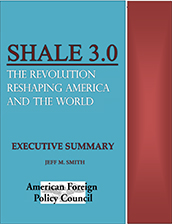
The world has long known of the existence of a virtual ocean of underground oil and gas deposits imprisoned in “tight,” low-permeable shale rock formations. Until recently, however, it was convinced there was no profitable extract them.
Did Kamaev get his comeuppance?;
Western NGO activists feel the heat
U.S. space dominance a double edged sword;
The Air Force's new cyber shield;
All eyes on electronic warfare;
China pushing new boundaries with its drones
A looming rupture in Russo-Turkish ties;
Russians increasingly see country in throes of economic crisis
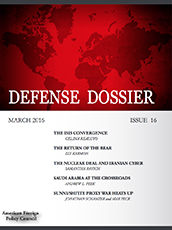
The Isis Convergence
The Return Of The Bear
The Nuclear Deal And Iranian Cyber
Saudi Arabia At The Crossroads
Sunni/Shi'ite Proxy War Heats Up
On Friday, Iranians went to the polls to select new representatives for the country's legislature, known as the Majles, and its Assembly of Experts, the powerful clerical body that oversees the performance of Iran's supreme leader. The results reflect a stronger-than-expected showing from the country's so-called "reformist" camp, particularly the political circles surrounding Iranian president Hassan Rouhani.
Russian truckers protest... and organize;
A booming illicit economy
US trade deficit with China reaches record high;
January capital outflows reach $110B amid economic turmoil
$3B Indo-Israeli defense deal close;
Pakistan joins Saudi military training;
45 terrorist organizations in Pakistan;
US approves sale of 8 f-16 fighters to Pakistan;
India's internationa fleet review shows new focus
As expected, last summer's nuclear deal is already shaping up to be an economic boon for Iran. From stepped-up post-sanctions trade with countries in Europe and Asia to newfound access to some $100 billion in previously escrowed oil revenue, the agreement (formally known as the Joint Comprehensive Plan of Action, or JCPOA) has put the country on the path toward a sustained national recovery.
Iran's campaign against the Baha'i continues;
Bahrain in the crosshairs...again;
Iranian attitudes, post-JCPOA;
Tehran's foreign legion;
Iran makes new nuclear plans
Wary in Minsk;
Gaming Russia's designs on the Baltics
No religion for Party members-even after retirement;
Eye on abandoned children of migrant workers
Henry Kissinger famously remarked some time ago that Iran must decide whether it wants to be "a nation or a cause." For decades, U.S. presidents of both parties have been trying to coax Tehran toward the former and away from the latter.
Most recently, the U.S.-led global nuclear agreement with Iran - with its scores of billions in sanctions relief that President Obama hoped Iran would invest to improve the living standards of its people - was designed to convince Tehran to abandon its revolutionary ways and become a nation in good standing.
The Islamic State's growing strategic capabilities;
Has the Islamic State come to Pakistan?;
Targeting ISIS finances...with bombs;
Iraq's Sunnis start to push back
A struggle over legal primacy;
Number of demographically-depressed regions gets bigger
Conspiracy theories in the Kremlin;
How Sputnik shapes European politics
Legal questions about laser weapons;
Russia's A2AD strategy;
New drone capabilities needed;
Hardening future fighters;
Hackers turned out the lights in Ukraine
Recent media accounts have argued that the U.S. government suffers from an absence of high-quality expertise on Russia. These accounts correctly note that funding for careers to ensure career opportunities for a continuing flow of people interested in Russia has dried up as well as the quantitative as well as qualitative lack of capable analysts. Undoubtedly we suffer from a shortage of funding and of professional interest in Russia, which is widely regarded as a busted flush of little account despite Ukraine and Syria. This shortage tallies with the president and his administration’s view that Russia is a declining regional power. Yet, as we have seen reality continues to belie such shortsighted thinking, particularly when it comes to the information battlefield and America’s struggle to contest Russian dominance in the weaponization of information used by the Kremlin against the United States and NATO.
Climate of fear in Russia impedes polling;
Putin's Soviet nostalgia
Peace in our time in Syria? Not even close. Last Thursday, international negotiators meeting in Germany announced that they had reached what was described as "an agreement toward halting hostilities." Not a ceasefire, not an armistice, but a deal to make another deal to possibly stop the fighting. "I'm pleased to say that as a result today in Munich," Secretary of State John Kerry said at the time, "we believe we have made progress on both the humanitarian front and the cessation of hostilities front... to be able to change the daily lives of the Syrian people." Note to Kerry: Try not to say "Munich" when announcing a peace deal, especially one doomed to fail.
Islamist mobilization in Tajikistan;
One step forward, two steps back for U.S. counterterrorism;
A tactical setback for terrorist media in southwest Asia;
An ISIS navy?;
Saudi Arabia steps in
Pakistan, Sri Lanka, Maldives hold trilateral mil exercises;
Bangladesh rejects Chinese deep sea port;
Looks to India, Japan;
Japan may build aircraft plan in India;
India receives new shipment of MI-17 helicopters
Chinese oil rig returns to disputed waters off Vietnam;
China may redesign Iranian reactors